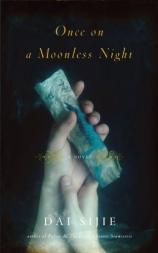Once on a Moonless Night
Review
Once on a Moonless Night
Some books are easy to describe. You start at the beginning, discuss the plot, main characters and conflict, and avoid revealing any major surprises to would-be readers. But ONCE ON A MOONLESS NIGHT, the latest from BALZAC AND THE LITTLE CHINESE SEAMSTRESS author Dai Sijie, is not so easy to write about. With shifting points of view, a barely linear progression of action, and stories within stories, this novel is complex and highly literary.
ONCE ON MOONLESS NIGHT is narrated by a French scholar of Asian and African languages. As a young student she spent time, in 1978 and 1979, in a newly opened China, studying. With social, cultural and economic tensions running high in Peking, she begins a relationship with a bright young man who worked in her neighborhood greengrocer's shop. Tumchooq Zhong, named for an ancient, almost lost language, was raised by his mother without knowing his father until he was older. His absent father was another French scholar, Paul d'Ampere, who turned his back on his wealthy European heritage for Chinese citizenship. His adult life was devoted to finding a scrap of ancient text, a legendary Buddhist sutra, written on silk, in the Tumchooq language. His obsession was so widely known that he was rumored to have traded his wife for the scrap.
In any case, he spent the last years of his life in a horrific Chinese labor camp, a prisoner of the state. d'Ampere's abandonment, forced or otherwise, of his family mirrors Tumchooq's abandonment of his French girlfriend years later when, after his father’s death, he picks up the search for the sutra and leaves her, unaware of her pregnancy.
The unnamed narrator returns to France and spends the next years studying, teaching and thinking about Tumchooq (the language and the man). Meanwhile, Tumchooq moves forward on his same path --- trying to understand the father he barely knew, fully know the language he was named for, and find the missing silk scrap of sutra. Their stories are intertwined with those of d'Ampere, various Chinese scholars, politicians and nobles, and even such figures as Marco Polo.
ONCE ON A MOONLESS NIGHT is an elegant and thoughtful novel. It explores scholarship as a passionate affair and religion as a holistic worldview, identity and oppression, literature, hope and romance. It is also a celebration of the joy of a good story. Sijie delights in storytelling generally and telling this story in particular. Language is another central theme. Written and spoken, language has powers and weaknesses: here it has the power to heal from madness and despair but also the power to drive people to obsession.
Sijie's latest must be read carefully. It requires full concentration because of the stories nested within other stories, the tangle of characters, and the scope of action from ancient China to the contemporary communist state. Sijie references many other works of literature, and attentive readers will be rewarded. This is a difficult but worthwhile and captivating novel with a beautiful ending sure to resonate with its audience.
Reviewed by Sarah Rachel Egelman on January 13, 2011
Once on a Moonless Night
- Publication Date: August 11, 2009
- Genres: Fiction
- Hardcover: 288 pages
- Publisher: Knopf
- ISBN-10: 0307271587
- ISBN-13: 9780307271587



